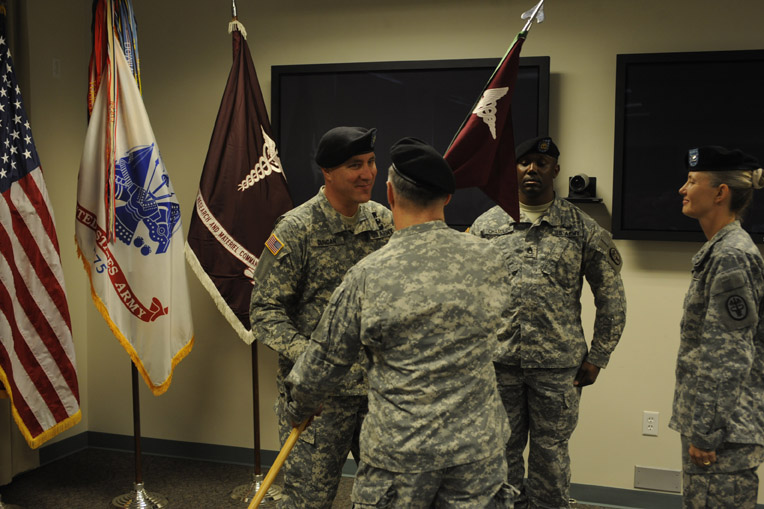U.S. Army Center for Environmental Health Research has its Change of Command Ceremony

Col. Peter J. Schultheiss, commander of the U.S. Army Medical Research Institute of Chemical Defense presided over the change of command ceremony for the U.S. Army Center for Environmental Health Research which Col. Andrea M. Stahl passed command of the Center to Lt. Col. Richard P. Duncan here at Fort Detrick, Md. April 8.
"USACEHR has been in good hands and will remain in good hands," said Schultheiss while thanking both commanders for their hard work.
Outgoing commander, Col. Andrea Stahl served two years as commander, from May 2009 to April 2011. Her next assignment won't be far. She will be the new deputy commander of the U.S. Army Medical Research Institute of Infectious Diseases.
"This is a bittersweet day for me," said Stahl and "It is with great difficulty that I say goodbye to such a great organization."
USACEHR personnel and guests came out to say farewell and good luck to Stahl as she moves onto her new assignment.
Duncan served as the deputy commander for the U.S. Army Center for Environmental Health Research for 8 months and now he looks forward to taking the reins as commander.
"It is always a privilege and honor to take command and more so when it is such an excellent organization like USACEHR. The unit has many accomplishments, due to the hard work of the professionals of the organization. I am extremely pleased to be the next commander," said Duncan.
He also said, "I was familiar with USACEHR and its mission, but the unit is expanding into new areas."
Duncan has been serving as deputy commander for the past 8 months which helped him learn more about USACEHR, its people, and accomplishments.
Duncan was born in Bay Shore, New York and raised in Amesbury, Mass. Duncan had many assignments before coming to USACEHR. His first assignment was Schofield Barracks, Hawaii where he served as medical platoon leader, Headquarters and Support Company, 84th Engineer Battalion. Other assignments include William Beaumont Army Medical Center where he served as deputy chief of the Department of Clinical Investigation up until his selection for a nominative assignment to be the medical research and development officer at the U.S. Army Science and Technology Center ' Europe, located in Wiesbaden, Germany. Duncan also moved to Aberdeen, Maryland to be the director of laboratory sciences at the U.S. Army Center for Health Promotion and Preventative Medicine (now the U.S. Army Public Health Command).
What does Duncan expect in the future?
"I expect the excellence of the past to continue. We are expanding with a new 'systems biology' mission, which will add personnel and research areas to the center. This will be a challenge, but one that we can meet," said Duncan.
 An official website of the United States government
An official website of the United States government
 ) or https:// means you've safely connected to the .mil website. Share sensitive information only on official, secure websites.
) or https:// means you've safely connected to the .mil website. Share sensitive information only on official, secure websites.


